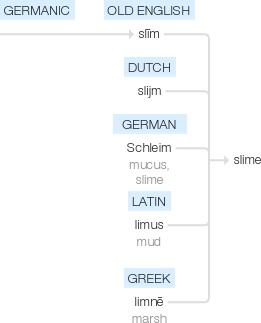Slime
Old English slīm, of Germanic origin; related to Dutch slijm and German Schleim ‘mucus, slime’, Latin limus ‘mud’, and Greek limnē ‘marsh’.
wiktionary
From Middle English slime, slyme, slim, slym, from Old English slīm, from Proto-Germanic *slīmą, from Proto-Indo-European *sley-(“smooth; slick; sticky; slimy”). Cognates include Danish slim, Saterland Frisian Sliem, Dutch slijm, German Schleim(“mucus, slime”), Latin limus(“mud”), Ancient Greek λίμνη(límnē, “marsh”).
etymonline
slime (n.)
Old English slim "slime," from Proto-Germanic *slimaz (source also of Old Norse slim, Old Frisian slym, Dutch slijm "slime, phlegm," German Schleim "slime"), probably related to Old English lim "birdlime; sticky substance," from PIE root *(s)lei- "slimy, sticky, slippery" (source also of Sanskrit linati "sticks, stays, adheres to; slips into, disappears;" Russian slimak "snail;" Old Church Slavonic slina "spittle;" Old Irish sligim "to smear," leinam "I follow," literally "I stick to;" Welsh llyfn "smooth;" Greek leimax "snail," limne "marsh, pool, lake," alinein "to anoint, besmear;" Latin limus "slime, mud, mire," linere "to daub, besmear, rub out, erase"). As an insult to a person from mid-15c. Slime-mold is from 1880.
slime (v.)
"to cover with slime," 1620s, from slime (n.). Related: Slimed; sliming.
